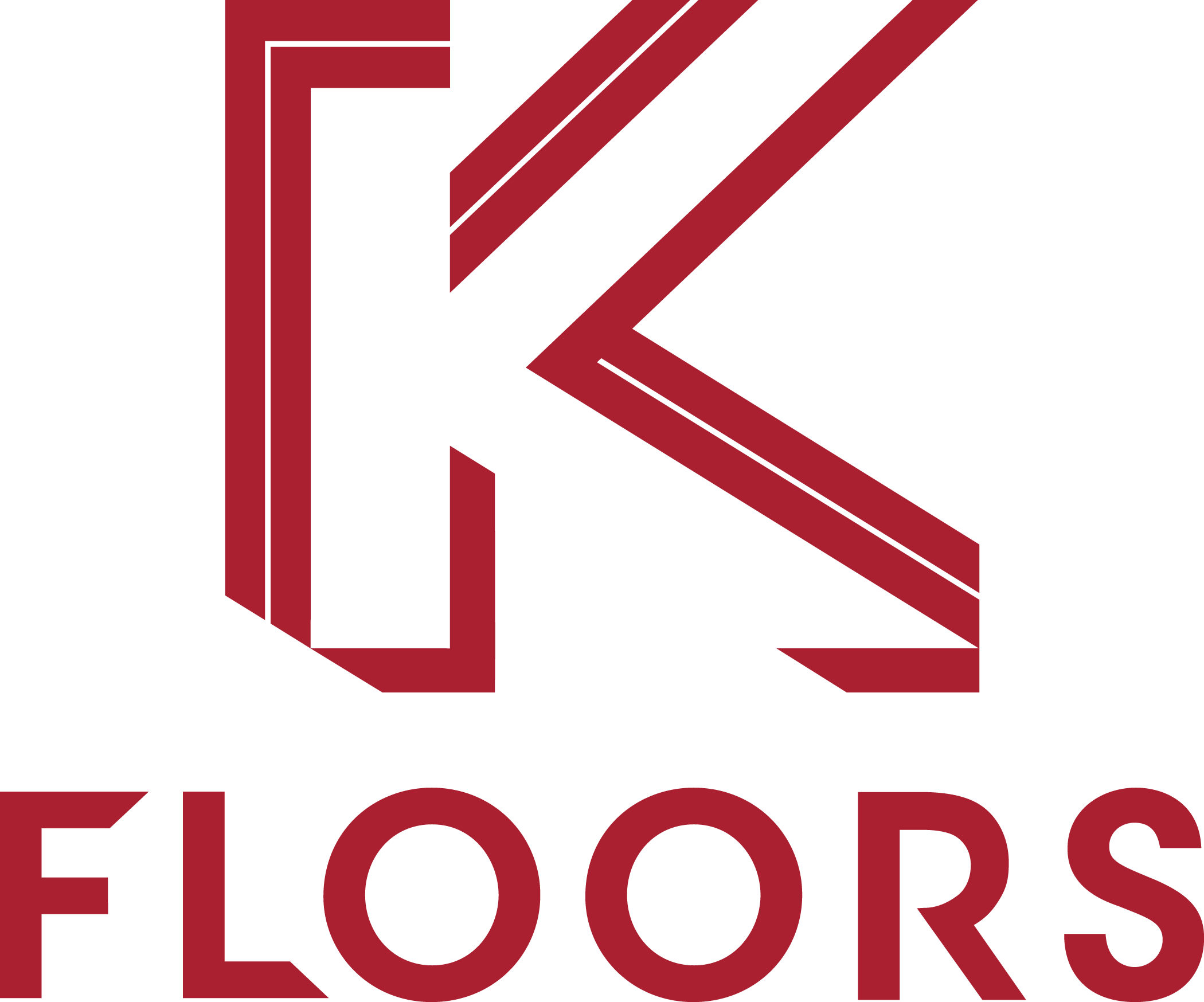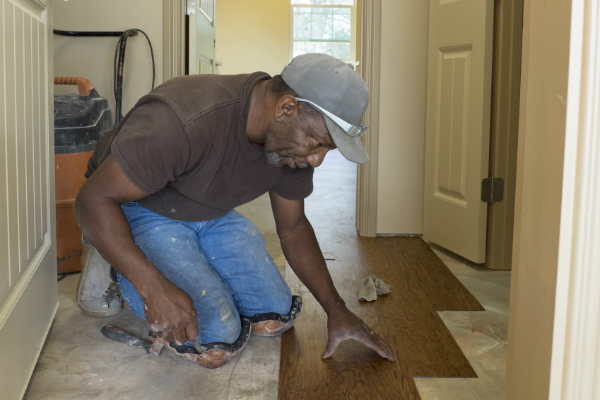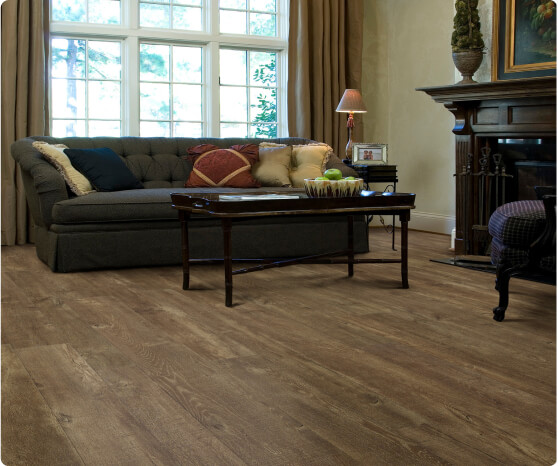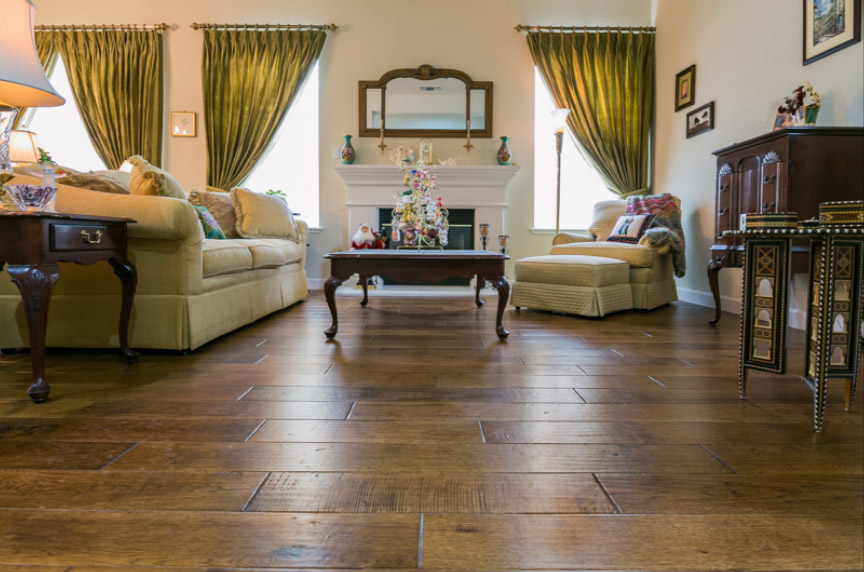Laminate flooring and vinyl plank are two popular choices for homeowners seeking durable and affordable flooring options. Both products offer a wide range of styles and designs, making it easy to find the perfect fit for any room in your home.
We’ll discuss factors such as durability, maintenance requirements, resistance to scratches and stains, installation process, and overall value for money. By understanding the pros and cons of each type of flooring, you’ll be able to choose the one that best suits your needs.
So if you’re in need of new flooring for your home but can’t decide between laminate flooring and vinyl plank, keep reading to find out which one comes out on top in this battle.
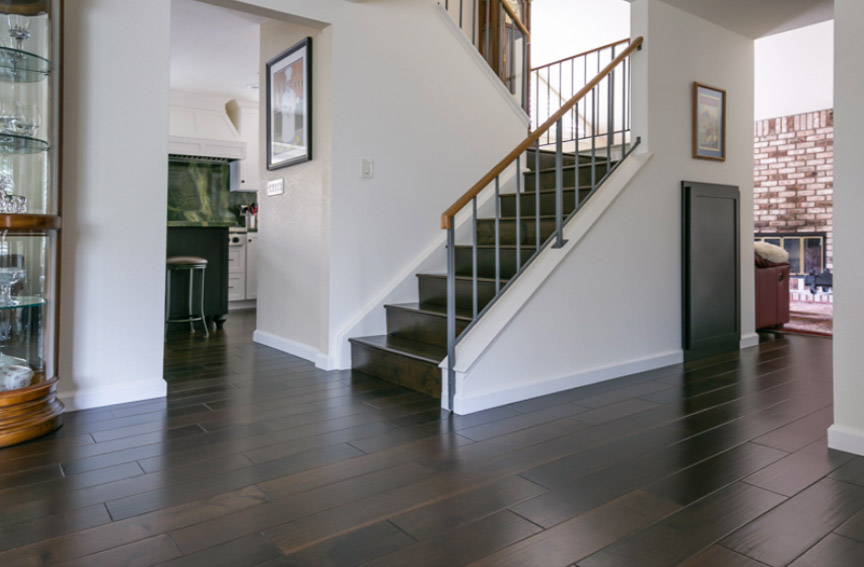
Table of Contents
ToggleDecoding The Flooring Contenders: Laminate And Vinyl
Understanding Laminate Flooring
Laminate flooring is a popular choice for homeowners due to its durability and affordability. It consists of multiple layers that work together to create a strong and resilient floor. The wear layer, which is the topmost layer, protects against scratches, stains, and fading, ensuring that your laminate floor remains in good condition for years to come. The decorative layer beneath it mimics the appearance of natural materials like hardwood or stone, giving you the aesthetic appeal without the high cost. The core layer provides stability and strength to the flooring, while the backing layer adds additional support.
Exploring The Layers Of Vinyl Flooring
Vinyl plank flooring, also known as LVP (Luxury Vinyl Plank), is another contender in the battle of flooring options. Similar to laminate flooring, vinyl plank consists of several layers that contribute to its overall performance. The wear layer on top acts as a protective shield against scratches, scuffs, and stains while preserving its visual appeal. Beneath it lies the printed design layer that utilizes high-definition printing technology to realistically replicate various materials such as wood or tile. The core layer with fiberglass reinforcement provides stability and durability, ensuring that your vinyl plank floor can withstand heavy foot traffic. Lastly, there’s the backing layer that adds extra support.
When comparing laminate flooring and vinyl plank flooring side by side, both options offer their unique advantages and features:
- Durability: Both laminate and vinyl plank floors are known for their durability. They are resistant to scratches and stains, making them suitable for high-traffic areas.
- Cost-Effectiveness: Laminate flooring is often more affordable than real hardwood floors while still providing a similar look. On the other hand, vinyl plank offers an even more budget-friendly option without compromising on quality.
- Moisture Resistance: While both types of flooring are water-resistant to some extent, vinyl plank flooring is generally considered more water-resistant than laminate flooring. This makes it a suitable choice for areas prone to moisture, such as bathrooms or kitchens.
- Installation: Both laminate and vinyl plank floors are relatively easy to install, often utilizing a click-lock system that doesn’t require adhesive. However, it’s important to follow the manufacturer’s instructions for proper installation.
Key Differences Between Laminate And Vinyl
Composition And Construction
Laminate flooring is made by compressing fiberboard and topping it with a photographic image that looks like real wood or stone. On the other hand, vinyl plank is created using PVC (polyvinyl chloride) mixed with other materials, resulting in a comfortable yet durable surface. Both laminate flooring and vinyl plank are engineered to withstand daily wear and tear.
Appearance And Aesthetics
Laminate flooring offers a wide range of realistic wood grain patterns that can enhance the beauty of any room in your home. With its advanced technology, laminate flooring can closely imitate the look of natural hardwood or stone. Similarly, vinyl plank comes in various styles that mimic materials like hardwood or tile without compromising on durability or affordability. Thanks to advancements in manufacturing techniques, both laminate flooring and vinyl plank provide stunning visuals that closely resemble their natural counterparts.
Water Resistance Capabilities
While laminate floors have some resistance to water, they are not entirely waterproof. This makes them suitable for areas with minimal moisture exposure, such as living rooms or bedrooms. On the other hand, vinyl plank flooring is highly resistant to water and can be installed in areas prone to spills, such as kitchens or bathrooms.Vinyl plank has the edge over laminate flooring.
When choosing between laminate and vinyl plank for your home’s flooring needs, it’s important to consider these key differences:
- Durability: Both laminate flooring and vinyl plank are designed to withstand daily wear and tear; however, vinyl plank tends to be more resilient.
- Installation: Laminate flooring often requires an underlayment for proper installation while vinyl plank can be installed directly on top of existing floors.
- Maintenance: Laminate floors require regular sweeping or vacuuming along with occasional damp mopping using manufacturer-approved cleaning solutions. Vinyl plank, on the other hand, is relatively low maintenance and can be easily cleaned with regular sweeping or mopping.
- Price: Laminate flooring is generally more affordable than vinyl plank, making it a budget-friendly option for homeowners.
- Environmental Impact: If sustainability is a concern, laminate flooring may be the better choice as it often contains recycled materials. Laminate floors can be recycled at the end of their lifespan.
Durability Showdown: Laminate VS. Vinyl Plank
Assessing The Longevity
Laminate flooring is known for its durability, making it a popular choice among homeowners. With proper care and maintenance, laminate floors can last up to 20 years. This means you can enjoy a beautiful and long-lasting floor without worrying about frequent replacements or repairs.
On the other hand, vinyl plank flooring also offers impressive longevity. Depending on the quality of the product, vinyl plank floors can last between 15-20 years or even longer. This makes vinyl plank a durable option that can withstand everyday wear and tear in high-traffic areas of your home.
Both laminate flooring and vinyl plank provide excellent longevity compared to other types of flooring materials like carpet or hardwood. Their ability to withstand heavy foot traffic and resist scratches and dents makes them ideal choices for busy households or commercial spaces.
Impact On Home Resale Value
The type of flooring you choose can have an impact on its resale value. Laminate flooring has gained popularity in recent years due to its attractive appearance and durability. Potential buyers are often drawn to laminate floors as they offer a cost-effective alternative to hardwood while still providing a similar aesthetic appeal. By investing in laminate flooring, you can enhance your home’s resale value by offering a durable and visually appealing flooring solution.
Similarly, vinyl plank flooring also has the potential to positively impact your home’s resale value. Its versatility makes it suitable for various rooms in the house, including high-moisture areas like bathrooms or basements where traditional hardwood may not be suitable. Vinyl planks are water-resistant, making them an excellent choice for areas prone to spills or moisture damage.
By installing vinyl plank floors in these areas, you not only create a visually appealing space but also provide potential buyers with peace of mind knowing that their new home is equipped with durable and low-maintenance flooring.
Investing in either laminate flooring or vinyl plank can be a wise choice when considering the future saleability of your home. These durable flooring options offer longevity, versatility, and aesthetic appeal that can attract potential buyers and increase the overall value of your property.
Installation Battle: Ease And Requirements
DIY-Friendly Options
Laminate flooring and vinyl plank both offer user-friendly installation options that make them accessible choices for DIY enthusiasts. Laminate flooring often features a click-lock installation system, allowing homeowners to easily install it without professional assistance. This click-lock mechanism makes the process straightforward and eliminates the need for messy glues or adhesives.
Similarly, vinyl plank also utilizes a similar click-lock mechanism, making it easy for homeowners with limited experience to install on their own. With this system, the planks simply snap together, creating a secure and seamless floor surface. Homeowners can save money by avoiding the cost of hiring professionals for installation.
Site Preparation Essentials
Both laminate flooring and vinyl plank require proper site preparation to ensure optimal results. Laminate floors need a flat subfloor that is free from any imperfections before installation. This ensures stability and prevents damage over time. It is important to address any unevenness or irregularities in the subfloor before laying down laminate planks.
On the other hand, vinyl plank also requires a smooth subfloor but offers more forgiveness. While it is still important to have a level surface, vinyl plank can accommodate slight variations in the subfloor without compromising its performance or durability.
To prepare the site for laminate flooring or vinyl plank installation, homeowners should thoroughly clean the subfloor and remove any debris or dust particles that could affect adhesion. They should check for moisture issues as excessive moisture can damage both types of flooring materials.
Maintenance And Cleaning Compared
Cleaning Tips For Longevity
To keep laminate flooring looking its best, regular sweeping or vacuuming is recommended. This helps remove dirt and debris that can scratch the surface. Occasional damp mopping with a mild cleaner will help maintain its appearance over time. By following these cleaning practices, you can extend the lifespan of your laminate flooring.
Vinyl plank flooring is also easy to clean and maintain. Regular sweeping or vacuuming is sufficient to remove dirt and dust particles. Similar to laminate flooring, occasional damp mopping using a mild cleaner will help keep vinyl plank looking fresh and clean. By incorporating these cleaning habits into your routine, you can ensure the longevity of your vinyl plank flooring as well.
Repairability And Ease Of Maintenance
Both laminate flooring and vinyl plank offer convenient options. Laminate flooring can be repaired by replacing individual damaged planks. This makes it a cost-effective choice in case of accidents or wear in specific areas. You won’t have to worry about replacing the entire floor; only the affected planks need attention.
On the other hand, vinyl plank’s resilient nature allows for easy repairs as well. If there are damaged sections, they can be replaced without requiring extensive repairs or replacement of the entire floor. This saves both time and effort.
Both laminate flooring and vinyl plank require minimal maintenance overall. Regular cleaning practices such as sweeping or vacuuming help prevent dirt buildup and scratches on both types of floors. Occasional damp mopping with appropriate cleaners keeps them looking their best.
Cost Analysis: Budgeting For Laminate And Vinyl Floors
Cost is a significant factor to consider. Let’s take a closer look at the upfront costs and long-term value of both options.
Upfront Costs VS. Long-Term Value
Laminate flooring is known for its affordability, making it an attractive choice for budget-conscious homeowners. With laminate, you can achieve the look of hardwood or stone at a fraction of the price. The upfront cost of laminate flooring is generally lower than that of vinyl plank. This makes it an excellent option for those who want to transform their space without breaking the bank.
However, it’s important to remember that long-term value should also be taken into account when making a decision. Laminate flooring offers durability and low maintenance requirements, which translates into long-lasting performance. It can withstand heavy foot traffic, resist scratches, and maintain its appearance over time. These qualities contribute to its long-term value as it reduces the need for frequent repairs or replacements.
On the other hand, vinyl plank may require a slightly higher initial investment compared to laminate flooring. However, it offers exceptional long-term value due to its longevity and resistance to wear and tear. Vinyl plank is highly durable and can withstand moisture, making it suitable for areas like kitchens or bathrooms where spills are common. Its ability to resist stains and fading ensures that your floors will continue looking great even after years of use.
Considering both upfront costs and long-term value is crucial when deciding between laminate flooring and vinyl plank. While laminate may have a lower initial cost, vinyl plank’s durability and longevity make it an investment worth considering in terms of long-term value.
Sustainability And Health Considerations
Environmental Impact Of Flooring Choices
Laminate flooring is an environmentally friendly option as it is typically made from recycled wood fibers. By using recycled materials, the demand for new resources is reduced, promoting sustainability. This makes laminate flooring a great choice for those looking to minimize their environmental footprint.
On the other hand, vinyl plank production involves the use of PVC (polyvinyl chloride), which can have environmental implications due to its manufacturing process and disposal challenges. The production of PVC involves the release of toxic chemicals, such as chlorine gas, which can harm both human health and the environment. Disposing of vinyl plank flooring can be problematic as it does not easily break down in landfills.
When considering eco-friendliness, laminate flooring has a slight advantage over vinyl plank due to its use of recycled materials and lower impact on the environment.
Compatibility With Heated Floors
If you’re looking to add radiant heating systems to your home for extra warmth during colder months, both laminate flooring and vinyl plank are compatible options.
Laminate flooring works well with most radiant heating systems, allowing you to enjoy cozy warmth underfoot while maintaining its durability. The heat from the system transfers efficiently through the laminate material, providing a comfortable living space.
Similarly, vinyl plank is also suitable for use with radiant heating systems. It retains heat effectively without compromising its durability or appearance. With vinyl plank flooring installed in conjunction with heated floors, you can enjoy a warm and inviting atmosphere throughout your home.
Whether you choose laminate flooring or vinyl plank, both options provide compatibility with heated floors for added comfort in your living space.
Conclusion
In conclusion, the comparison between laminate flooring and vinyl plank has highlighted their key differences in terms of durability, installation, maintenance, cost, sustainability, and health considerations. Laminate flooring offers greater durability and a more authentic look, while vinyl plank is easier to install and maintain. Both options have their advantages and disadvantages, making it important for individuals to consider their specific needs and preferences when choosing between the two.
To make an informed decision, individuals should assess their budget, desired aesthetic, lifestyle factors, and environmental concerns. Consulting with flooring professionals or conducting further research can provide valuable insights into the best choice for each unique situation. Whether opting for laminate flooring or vinyl plank, it is crucial to prioritize quality materials and professional installation to ensure long-term satisfaction.
By understanding the pros and cons of laminate flooring and vinyl plank, readers can confidently navigate the selection process and make a choice that aligns with their specific requirements. Remember to consider factors such as durability, ease of installation and maintenance, cost-effectiveness, sustainability, and health considerations when deciding between these two popular flooring options.
Struggling To Find The Perfect Laminate Flooring That Aligns With Your Unique Vision?
Located in the bustling heart of Concord, California, K Floors is your ultimate destination for turning your vision into reality when it comes to laminate flooring. We’re not just another flooring company; we’re your trusted partners in crafting spaces that radiate quality, dependability, and an unparalleled selection. Whether you’re envisioning the timeless allure of laminate wood, the rustic charm of textured laminates, or the contemporary sophistication of high-gloss laminates, our range is as diverse as your creative imagination.
The K Floors distinction is unmistakable. Say goodbye to the uncertainty of selecting the perfect laminate flooring. Our team of seasoned experts is dedicated to guiding you every step of the way. From complimentary in-home consultations, where we bring our expertise right to your doorstep, to our collaborations with leading laminate suppliers, we ensure that excellence isn’t just a promise—it’s our legacy. Explore our extensive collection, showcasing a variety of laminate options, including Wood-Look, Textured, High-Gloss, and more. Your ideal floor isn’t merely a purchase; it’s a carefully curated choice.
At K Floors, we’re committed to delivering an experience, not just a transaction. Rooted in Concord, California, we’ve seamlessly blended traditional craftsmanship with modern aesthetics, ensuring that each laminate we install transforms your space into a place that truly feels like home. Whether you’re embarking on a residential renovation or a commercial transformation, every project we undertake reflects our unwavering commitment to quality and authenticity. So why delay? Step into K Floors, and let’s embark on the journey to your perfect laminate flooring together.
Disclaimer
The materials available on this website are for informational and entertainment purposes only and not to provide legal advice. You should contact your attorney to obtain advice concerning any particular issue or problem. You should not act or refrain from acting based on any content included in this site without seeking legal or other professional advice. The information presented on this website may not reflect the most current flooring developments. No action should be taken in reliance on the information contained on this website and we disclaim all liability concerning actions taken or not taken based on any or all of the contents of this site to the fullest extent permitted by law.
